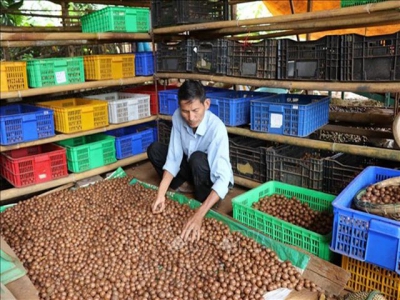Retired soldier gets rich from macadamia trees

GIA LAI — Veteran Phạm Hữu Đương is busy all day in the garden to look after 8ha of crops that are bringing high profits to his family as well as creating jobs for dozens of locals.
Veteran Phạm Hữu Đương with his products from macadamia trees which are intercropped in pepper and coffee gardens in Gia Lai Province. — VNA/VNS Photo Hồng Điệp
The 73-year-old man lives in Ia Phìn Commune, Chư Prông District, the Tây Nguyên (Central Highlands) province of Gia Lai. After getting seriously injured in 1979, he left his hometown of Thái Bình to settle in Gia Lai Province.
He began focusing on developing trees, especially pepper and coffee, that suited the Central Highlands' red basaltic soil, Tin Tức (News) online newspaper reported.
After many failures due to improper farming, in 2010, the wounded veteran went to Đắk Lắk Province to buy 1,000 macadamia seedlings to plant in his garden.
The macadamia trees grow well and he decided to plant another 1,000 trees.
His family now has about 8ha of macadamia trees intercropped with coffee, banana, cashew, đinh lăng (polyscias fruticosa) and pepper.
As a pioneer in planting macadamia trees in the province, Đương said: "Macadamia is a woody tree and can be over 15m high. It grows very well in this red basaltic soil and can be harvested for 40-60 years.
"I can intercrop other crops in the garden but not affect their growth."
Each year, he can harvest about 10 tonnes of nuts from 1,000 previously grown macadamia trees. He has also invested in peeling and drying machines, so the product is manufactured under a closed process.
The price of macadamia nut is at VNĐ250 million (US$10,780) per tonne.
The retired soldier has signed contracts for his products with businesses in HCM City, earning VNĐ2.5 billion ($107,700) per year.
The current shortage of irrigation water in the dry season and disease outbreaks in trees, especially pepper and coffee trees, have caused risks and affected the income of farmers in the province, according to the province’s Plant Cultivation and Protection Sub-department.
The sub-department has encouraged more farmers to intercrop other plants in their gardens to reduce risks and improve the efficiency of farmland, said Hà Ngọc Uyển, head of the Plant Cultivation and Protection Sub-department.
After many pepper and coffee trees died because of disease outbreaks and old age in recent years, many farmers in the province began intercropping short-term and long-term crops in their gardens.
The intercropping has helped farmers increase income as they waited for harvest of the main crops of coffee and pepper. It also reduced risk of losses when coffee and pepper prices fell, according to farmers.
"When the macadamia trees are young, I harvest pepper, coffee, cashew and bananas," Đương said.
Đương's macadamia garden has also given jobs to dozens of local labourers, including veterans and elders in the region.
Seven workers are hired to fertilise the trees, prune, harvest, sort and dry the nuts.
In the harvest season of other crops, he has to hire about 10 more workers. Each worker can earn VNĐ4.5-5 million per month.
"My family is getting better thanks to Đương. My wife and I work for his garden. The work is not hard and suitable for the elders," said Trịnh Văn Việt, a 55-year-old farmer from Ia Phìn Commune.
With experience of growing macadamia for many years, Đương was invited to a recent conference on potential development of macadamia trees held by the provincial Department of Agriculture and Rural Development in collaboration with the Việt Nam Association of Macadamia to share his experience of macadamia cultivation.
According to Hoàng Thị Ngát, deputy head of the Department of Agriculture and Rural Development of Chư Prông District, Đương's garden became a typical farming model in Gia Lai Province with high productivity and efficiency.
His macadamia nuts is expected to be chosen as the product qualified for standards of One Commune-One Product (OCOP) programmes, according to Ngát.
Đương not only enriches himself, he often helps and supports members of Chư Prông District Veterans Association.
With funds of more than VNĐ100 million per year, he lends its members without interest and encourages and guides members in business to gain high efficiency.
According to Đương, in order to develop sustainable agriculture, farmers should switch to organic farming, ensuring both health and safety for users as well as long-term economic efficiency.
Có thể bạn quan tâm
 Will technical barriers imposed by the Philippines create difficulties for Vietnam’s rice
Will technical barriers imposed by the Philippines create difficulties for Vietnam’s rice Will technical barriers imposed by the Philippines create difficulties for Vietnam’s rice exports?
 Vietnam emerges as the world’s No2 rice exporter
Vietnam emerges as the world’s No2 rice exporter Vietnam has beaten Thailand to become the second biggest rice exporter in the world after the latter decided to slash rice exports due to prolonged drought
 Bến Tre to solicit investment in hi-tech agriculture
Bến Tre to solicit investment in hi-tech agriculture The Cửu Long (Mekong) Delta province of Bến Tre will offer incentives to attract investments in hi-tech agriculture and in projects with high value-addition